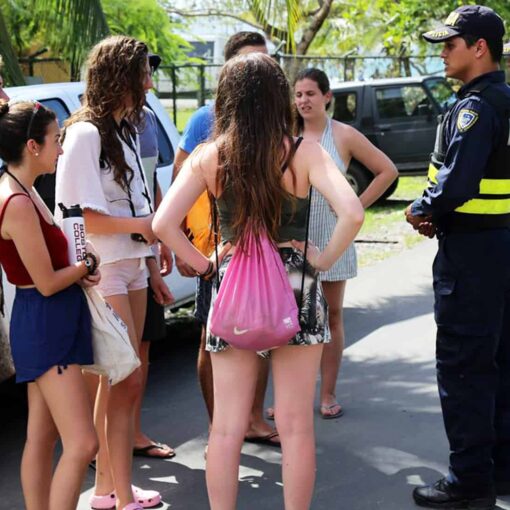QCOSTARICA — In a police operation that shakes the country’s telecommunications and cybersecurity landscape, Organismo de Investigación Judicial (OIJ) and the Public Prosecutor’s Office’s Cybercrime Unit agents raided the telecoms Liberty, Telecable, and state operator, the Instituto Costarricense de Electricidad (ICE), operator of the kölbi brand, on Tuesday, due to an alleged refusal to cooperate with a criminal investigation into digital banking fraud.
The raid is part of the international Operation Nexus, coordinated with Colombian authorities, which seeks to dismantle a criminal organization dedicated to cloning the Banco Costa Rica (BCR) website.
The objective of this network was for BCR users to be redirected to ‘fake’ BCR websites, to steal the banking credentials of users and thus access funds deposited in their accounts.
– Advertisement –
According to authorities, the raided companies allegedly failed to provide crucial data to track the devices and IP addresses from which the crimes were perpetrated.
Raids Due to Lack of Cooperation
Randall Zúñiga, director of the OIJ, explained in a press conference that the three companies were asked on multiple occasions to provide technical information on at least 15 mobile devices allegedly used in the scams.
However, he reported that they “refused” to cooperate, unlike other companies in the sector that did respond positively to the judicial requests.
“Their offices were raided to determine whether they have the technological capacity to provide this cooperation, as other operators do,” Zúñiga stated.
Zúñiga emphasized that this situation exposes an urgent need to modernize the Costa Rican legal framework through the approval of Bill 24,170, which would require telecommunications operators to share technical information in the context of criminal investigations.
– Advertisement –
Companies Reject Allegations
The three companies involved denied any noncompliance and expressed surprise at the OIJ’s actions.
Through official statements, they affirmed that they have acted in strict compliance with current legislation and safeguarded the privacy of their customers.
Liberty Costa Rica, through its legal director, José Gutiérrez, emphasized that the company has historically collaborated with the country’s judicial authorities and has staff dedicated exclusively to responding to official requests.
– Advertisement –
“The raid is not related to fraud committed against our customers, but rather to technical data requested regarding individuals under investigation,” he clarified.
For its part, Telecable, through its general director, Rodolfo Apéstegui, expressed its “firm commitment” to the fight against cybercrime. “We have provided all the information requested by the competent authorities,” Apéstegui insisted.
Along the same lines, ICE/kölbi stated that it complies with legal protocols designed to protect the personal data of its users, but reiterated its willingness to collaborate always “within the legal framework.”
In addition, the Chamber of Infocommunication and Technology (Infocom), which represents the three companies involved, issued a statement supporting its affiliates. In it, it asserts that Liberty, Telecable, and kölbi have provided technical information, including IP addresses linked to the case under investigation.
A transnational network with a presence in Colombia
Operation Nexus is not limited to Colombia. In Medellín, Colombia, authorities simultaneously carried out three raids linked to the same criminal group.
According to the OIJ, 28 suspects have been identified and 24 cases directly related to this network, although it is presumed that there could be many more victims.
The scheme consisted of cloning the official BCR website and, using social engineering techniques, tricking users into entering their banking credentials. The criminals then used these credentials to make transfers to domestic accounts.
Rise of Cybercrime
The magnitude of the case not only highlights the growing sophistication of digital organized crime, but also an alarming national trend. Randall Zúñiga warned that cybercrime has grown 668% since 2020, surpassing even traditional crimes such as armed robbery.
“Criminals are migrating to this modality due to its high economic returns and low risk of being caught,” emphasized the head of the OIJ. He added that many of these crimes are committed from abroad, which further complicates investigations and requires greater technical capabilities and collaboration from private sector actors.
Privacy versus Security
The operation has reopened a recurring debate in Costa Rica: the balance between the protection of personal data and the need for collaboration with judicial authorities in cases of organized crime. While telecommunications operators cling to their duty to protect their users’ privacy, state security forces are demanding more effective tools to act quickly and accurately in criminal investigations.
Bill 24,170, currently in legislative proceedings, is presented as a possible solution to this tension. The initiative seeks to establish clear technical collaboration obligations for digital service providers, without violating constitutional guarantees.
Although the legal debate is just beginning, Operation Nexus and the raids on three of the country’s main telecommunications companies mark a milestone in the fight against cybercrime in Costa Rica.
Against the backdrop of booming cybercrime and pressure to adapt laws to the 21st century, the country faces the challenge of strengthening its digital defenses without compromising fundamental rights.
– Advertisement –
Source link
Rico



